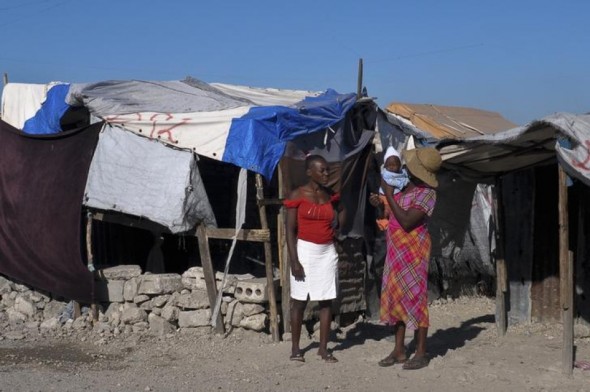April 23, 2013

Haitians living in a camp for people displaced by the January 2010 earthquake, Port-au-Prince January 3, 2013. Photo: REUTERS/Swoan Parker
Some dodge the stones and bottles thrown at their tents in the dead of night, others watch helplessly as their tarpaulin shelters, huddled in camps sprawled across the Haitian capital Port-au-Prince, are destroyed with knives and sticks.
Rights group Amnesty International has collected dozens of such testimonies from Haitians who have been kicked out of makeshift camps set up by those left homeless by the January 2010 earthquake. Many camp residents have moved out, but just over 320,000 Haitians still live in them.
In its report released on Tuesday, rights group Amnesty said one in four camp dwellers face the risk of being evicted by landowners who want to reclaim their land, and increasing numbers are being forced out of camps, a practice that is carried out or condoned by the Haitian authorities.
“Around 10 a.m. a group of police officers accompanied by men armed with machetes and knives arrived at the camp. They insulted us and began to demolish our tents. The men pushed us around and the police waved their guns at us to prevent us from reacting,” Suze Mondesir, a former camp resident evicted from a camp in Port-au-Prince last January, is quoted as saying in a statement by Amnesty on Tuesday.
Haitian authorities have carried out forced evictions to clear public squares and spaces, while other evictions have involved private landowners eager to get their property back, the Amnesty report said.
“We have heard of state authorities taking part in illegal evictions, including justices of the peace turning up with armed groups with machetes and knives. The authorities are not doing enough to protect camp residents from forced convictions pro-actively. There has been no justice for the families who’ve been evicted, often without consultation and no warning,” James Burke, one of the report’s researchers and campaigner for the Caribbean region at Amnesty, told the Thomson Reuters Foundation in a telephone interview from Port-au-Prince.
“We are calling on the government to stop forced evictions. The government needs to send a message to private landowners that there is a due judicial process they have to go through to reclaim their lands and that the threat of eviction will not be tolerated. People don’t know from one day to the next whether they’ll be on the streets,” he said.
Haitian authorities say they are investigating specific cases where police are alleged to have been involved in forced evictions.
Since July 2010, nearly 62,000 people have been evicted from the camps, including almost 1,000 families during the first three months of this year, according to the International Organisation for Migration (IOM).
SEX FOR FOOD
Amnesty’s report found that poverty and the dire living conditions in the camps, coupled with poor prospects of getting a job, “have led some women and girls to engage in transactional or survival sex.”
“We spoke with 150 people, the majority women, and there is anecdotal evidence that transactional sex goes on so that women can survive and feed their families. There are women who are placed in situations where they are forced to exchange sex for food,” Burke said.
Overcrowding in the camps, a lack of lighting at night and few police on patrol, are other reasons why many women and girls living in camps have been victims of sexual violence, including rape, the Amnesty report said.
The report, based on three field visits by Amnesty to Haiti in 2011 and 2012, said most of those evicted have been driven deeper into poverty and often made homeless once again.
“Forced evictions pulled to pieces what women and families had arduously built up over months, destroying their means of earning a living and pushing them even further into poverty,” the report said.
HOUSING CRISIS
The shortage of housing in Port-au-Prince was an acute problem even before the quake hit, with around 70 percent of people living in slums.
The government of Michel Martelly has said that resettling camp dwellers is a priority and has drafted the country’s first ever housing policy.
“It’s at least an initiative to address housing in Haiti. It’s still a draft and it has a long way to go. We hope the housing policy puts human rights and the most vulnerable at the heart of their plans,” Burke said.
Efforts to resettle quake survivors in new housing or repaired homes have been hampered by political uncertainty, poor coordination, a cholera epidemic and longstanding land tenure problems.
The Haitian government and international aid agencies are running schemes to move families from camps on public and state-owned land into safe and repaired homes by offering them rental subsidies.
Such initiatives have helped reduce the number of people in tent cities by nearly 80 percent from a peak of 1.5 million in July 2010. But forced evictions appear to have become an important factor behind the decrease in camp numbers, Amnesty said in its report.
In the absence of any long-term solution to Haiti’s housing crisis, camp dwellers continue to face deteriorating conditions.
“Some of the camps we visited had four latrines for 1,000 people. None of them had access to drinking water. Sanitation is horrendous,” Burke said.
Read Amnesty’s report here.
Source: TRUST

Leave a Reply